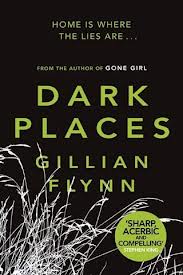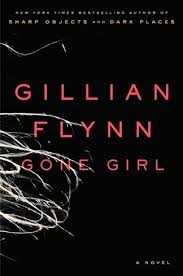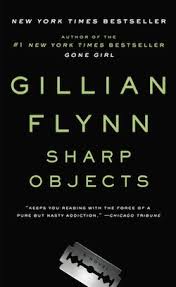Gillian Flynn Times Three
4/13/15 GILLIAN FLYNN TIMES THREE
Gone Girl was all the rage in 2013 and into 2014, especially with the announcement of taking the book to film. Everyone I knew that had read the novel seemed to grumble about the ending. None of them seemed to like it. In fact they were outraged, as though they’d been cheated. I’m sure they would have asked for their money back if they could. Begrudgingly (probably due to my jealousy of Flynn’s flaming success) I decided that I would just have to read the darn thing myself, but first, my journey to Gone Girl would have to begin with Sharp Objects.
Ms. Flynn’s debut novel, Sharp Objects, is told in a first person point of view by protagonist Camille Preaker, a Chicago reporter for the Daily Post. Her Hush Puppy wearing editor, who smells of cigarettes, old coffee, and has teeth soaked in brown tobacco saliva, sends her on an assignment to report on the murder of two young girls in her rural hometown of Wind Gap, Missouri. This is last place on earth Preaker wants to go. The reasons are; her mother, her stepfather, her half-sister (whose name she sometimes forgets), but mostly because of the memory of her deceased sister, Marian.
Like the editor, all of the characters in the story get painted with an ugly brush. Preaker is full of deep psychological issues that make her a very interesting but also very unlikeable person. You would not want to invite her for dinner. Her mother “was like a girl’s very best doll, the kind you don’t play with” a description that says more about personality than appearance. Acid sarcasm drips from her half-sister’s lips when she’s not little Miss Perfect in front of her mother. Her stepfather is as useless as a drone in a beehive.
The novel is riddled with mysteries that go well beyond the murder of two girls. What is the evil that exists in this town? What drives Camille to the horrible decisions she makes? What really happened to sister Marion?
At the end of the novel I was hooked. Like an alcoholic I needed another Flynn.
Dark Places came next and I was introduced to a new protagonist, Libby Day, and, as incredible as it may seem, she is  even more unlikeable than Camille Preaker. Libby was seven years old when she testified in court that her fifteen-year-old brother murdered their mother and two sisters in a bloody satanic ritual.
even more unlikeable than Camille Preaker. Libby was seven years old when she testified in court that her fifteen-year-old brother murdered their mother and two sisters in a bloody satanic ritual.
Camille and Libby are both very lonely people but lonely in vastly different ways. Camille’s loneness arises out of rejection and she desperately wants to be liked and loved. Libby is a ball of rage that uses people for her own benefit. She survives financially out of a nearly exhausted trust fund created for her as a child after the slaughter of her family. A group obsessed with famous crimes contacts her with the hope she will give them information that would prove her brother is innocent. Libby hopes to milk them for as much money as she can get.
Libby soon realizes she never actually saw her brother commit the murder. He might have, but it could also have been their estranged father, a man of questionable morals and with a motive, or maybe a hired killer, but why?
After that, I was a goner for Gone Girl.
Now I meet the beautiful, intelligent, charming Amy Elliott Dunn. I asked myself, what happened to the unlikeable female protagonist that Ms. Flynn is so adept at introducing into her stories? Amy is nothing like Camille or Libby.
Amy and her husband Nick Dunn in alternating chapters tell the story. They start out as the perfect Manhattan couple until Nick loses his job. Financial problems and family issues require them to move to Nick’s hometown, Carthage, Missouri. And then things begin to go bad very quickly.
It doesn’t take very long for you to begin to dislike Nick. It will take a lot longer before you realize that sweet, loveable Amy is much, much worse than Nick.
Last month Sally Whitney, in her LLNB essay The Power of the Characters We Hate, identified Amy Dunne as one of those hateful people. Sally is correct to cast Amy in that light. While you may feel sorry for the unlikeable Camille and Libby, you will feel nothing like that for Amy.
The amazing thing about Gillian Flynn is her ability to create characters like Camille, Libby, and Amy, characters you would never want to go near, and yet you are compelled to follow them to the completion of their journeys. I wish there was a fourth novel.
All three novels stand alone, none of the characters are connected, and it is not necessary to read them in order of publication. Sharp Objects was an Edgar nominee for Best First Novel and won the Dagger Award, and was a New York Bestseller, as were Dark Places and Gone Girl.
Michael J. Tucker
Growing up in the cold northern climate of Pittsburgh, PA, and an only child, Mike was often trapped indoors and left to his own devices, where he would create space ships out of cardboard boxes, convert his mother’s ironing board into a horse and put on his Sunday suit and tie and his father’s fedora and become a newspaper reporter or police detective. This experience left him with an unlimited imagination and the ability to write electrifying short stories and novels.
Mike is the author of two critically acclaimed novels, Aquarius Falling and Capricorn’s Collapse. He has also published a collection of short stories entitled, The New Neighbor, and a poetry collection; Your Voice Spoke To My Ear. His poem, The Coyote’s Den, was included in the Civil War Anthology, Filtered Through Time.
He is a judge for the Janice Keck Literary Award, and the moderator of the Williamson County Library Writers’ Critique Group.
Reviewers of Mike’s novels have compared his writing to: Thomas Wolfe’s I Am Charlotte Simmons, and J. D. Salinger’s Catcher in the Rye. Albert Beckus, Professor Emeritus of Literature at Austin Peay University recently wrote of his novels: “They move naturalistically in the American literary tradition of Theodore Dreiser’s An American Tragedy, but with a twist…as found in The Great Gatsby.”
- Web |
- More Posts(22)
